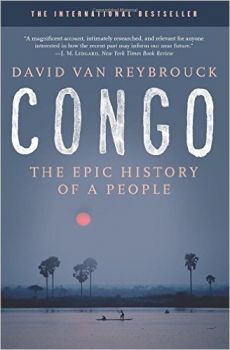Book - 'Congo: the epic history of a people' by David van Reybrouck

When book-loving readers of ICN think of Congo, they probably recall 'The Poisonwood Bible,' Kingsolver's remarkable tale of missionaries at the time of independence, or Hochschild's 'King Leopold's Ghost'. David van Reybrouck has produced an equally essential tome, perfect for anyone wishing to understand both this tragic country, and all that has gone wrong in the continent of Africa.
Blessed and cursed with mineral resources, Congo has been badly ruled, first by selfish village chiefs, then by greedy colonialists, and now by home grown despots and kleptomaniacs. Its dismal history keeps repeating itself: armies that kill, rape and loot their own citizens; rulers who fritter away the country's wealth after foolishly signing disadvantageous deals with foreign companies; and international players who turn a blind eye to atrocities, so long as the perpetrators remain 'on our side' in the fight against local rebels (during the colonial period), communists (during the Cold War) or Islamic terrorists (now).
In 1888 a Scots vet called Dunlop invented the inflatable rubber tire, thereby starting a bonanza in Congo. The Belgian colonialists used local thugs to collect a 'tax' of rubber from villagers, killing those who failed to deliver, cutting off their hands to present like a receipt to their bosses, proving they hadn't wasted the bullet.
Van Reybrouck argues the Belgians provoked heightened ethnic divisions which fated politics in post-independence Congo to be trapped in a destructive and violent tribal pattern. The Belgians departed in a panic in 1960, leaving no one qualified to run the nation. By 1965 the CIA's man, Mobutu, was in control: his first act was to hang four prominent opposition politicians, setting the tone for the following decades of repression. Congo became Zaire, effectively his personal bank account. He hired Concord to go to Euro Disney, and had twelve properties in Brussels alone. The IMF bailed out Mobutu, assuming the invisible hand of the market would sort it all out.
More recently, the Kabila family has taken turns at thieving from Congo. Junior's personal budget is eight times the national health budget. The scramble for power and minerals since 1998 is believed to have caused the deaths of five million Congolese, a tragedy that is hardly reported.
Van Reybrouck's history is brimming with fascinating detail: in 1960 people buried boxes of stones, believing they would become gold after independence. Che Guavara despaired of teaching the rebels who refused to train or dig trenches because they were protected by magic. Congolese army soldiers tied twigs to their rifles, also believing the rebels were magic. The opposition presidential candidate's supporters routinely ate people during the last election campaign.
When your reviewer visited Congo, I was held at gun point three times by drugged-up child soldiers within the first hour. I bought my freedom with $1 each time. While Van Reybrouck conveys this madness, he also salutes the patient, passive Congolese who endure such horror, decade after decade.















